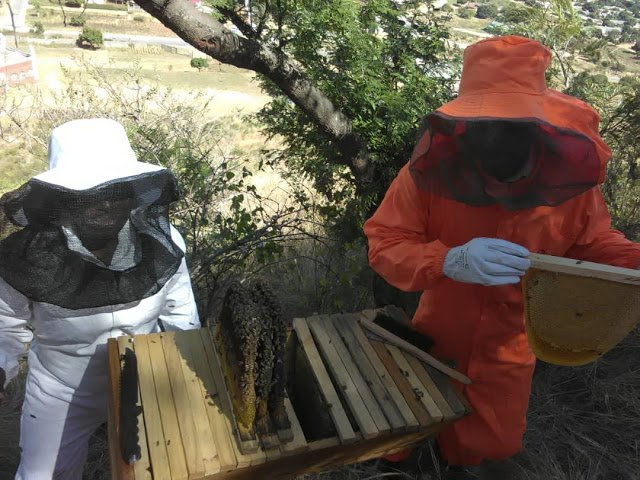Felix Matasva
MUTARE – Two Dangamvura-based
professional beekeepers have established a bee sanctuary on a deforested
mountain surrounding the western high density suburb as part of efforts to
rebuild biodiversity and establish ecotourism.
Ishmael
Sithole and Willet Mtisi established the sanctuary also as part of conservation
efforts for bees that look increasingly endangered by human activity.
Sithole,
who is also vice chair of Manicaland Apiculture Platform told TellZim News the
sanctuary exists to help bees flourish in face of many dangers that include
climate change, pollution and human intrusion into their natural habitat.
“There
was no proper place to rehabilitate bees. We are therefore offering removal
services meant to limit human and bee conflict in neighbourhoods. Bees no
longer have a safe habitat within mountains so they invade neighbourhoods for
some space on the trees.
“After
removing the bees, we rehabilitate them at this sanctuary where they have less
interaction with humans. The sanctuary is also promoting growth of various plant
and animal species thereby helping to prevent them from going extinct,” he
said.
Sithole
said that they had plans to turn the bee sanctuary in Dangamvura Mountain to a
hub of ecotourism.
“Some
people who live in Mutare have never seen a bee hive. We aim to change residents’
negative perceptions about bees. We want to turn this place into a hub of
ecotourism where people visit and interact with bees without any conflict.
“By
visiting our sanctuary, people will appreciate that when we take care of our
environment, it also takes care of us. The sanctuary is also ideal for
bee-keeping training leading to employment creation as honey is needed for
consumption, medicinal purposes and production of beverages,” Sithole said.
He
said they planned to reverse the massive deforestation and land degradation
happening in the mountain.
“We
have started to see results of the conservation efforts. We now have a number
of big acacia trees surrounding our apiary. We want to fence the whole
sanctuary, put signage so as to avoid trespassers and then put more hives.
It
was in 2011 when Mtisi started to practise beekeeping as a career after
Environmental Africa accorded her a training opportunity.
In
2016, she was part of a team which trained people in various districts under the
auspices of Environmental Management Agency (Ema).
Mtisi,
a Manicaland Agriculture Show Society board member, believes beekeeping is a
passion and she has registered a company called Climate Smart Bees.
“I
love this work but it’s unfortunate that many people consider it to be a
preserve for men. So many times I lost customers who thought a woman could not
offer removal services. I however thank Ema, Forestry Commission and MC Johnson
Apiaries for believing in my capabilities,” said Mutisi.
MC
Johnson Apiaries, which was registered by Sithole, and Climate Smart Bees also run
a workshop at Boka Shopping Complex where they produce honey, beehives,
smokers, bee wax candles and many other accessories needed by beekeepers.
With
over 20 000 species, bees play a crucial
part in the ecosystem as they support the growth of trees and flowers which
serve as food and shelter for many creatures, and they are vital to food
security for people.
According
to World Wide Fund for Nature, 70 of the top 100 food crops worldwide rely on
pollinators like bees and without them, the world will lose such foods as
apples, almonds, oranges and avocados.
The
United Nations (UN) says close to 35 percent of invertebrate pollinators, particularly
bees and butterflies, and about 17 percent of vertebrate pollinators such as
bats are facing extinction globally.


